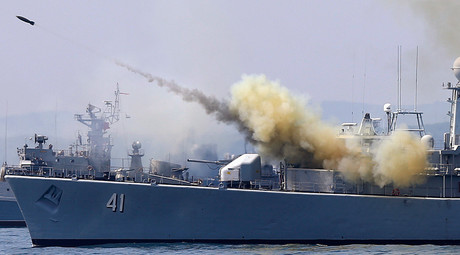NATO mission creep in Eastern Europe fomenting Cold War II
Robert Bridge is an American writer and journalist based in Moscow, Russia. His articles have been featured in many publications, including Russia in Global Affairs, The Moscow Times, Russia Insider and Rethinking Russia. Bridge is the author of the book on corporate power, “Midnight in the American Empire”, which was released in 2013
Using the preposterous pretext of 'Russian aggression', NATO is putting in motion a dangerous dynamic in Eastern Europe that has every possibility of spiraling out of control.
During a press conference in Brussels, NATO Secretary General Jens Stoltenberg gave a polite yet unmistakable command to NATO’s 28 member states that they will be expected to contribute their share to the ongoing militarization of Eastern Europe.
“I expect ministers to agree to enhance our forward presence in the eastern part of our alliance,” Stoltenberg said. “This will bolster our collective defense, and at the same time send a powerful signal to deter any aggression or intimidation.”
Stoltenberg passed around the battered hat after the Pentagon announced it would quadruple military spending in Europe to $3.4 billion for the so-called European Reassurance Initiative.
"We're taking a strong and balanced approach to deter Russian aggression," US Defense Secretary Ash Carter told the Economic Club of Washington last week. "We haven't had to worry about this for 25 years, and while I wish it were otherwise, now we do."
The result of this massive increase of spending will be more military hardware, more troops, more provocative exercises on Russia’s western flank and much more tension between Moscow and NATO - which once upon a time promised Russia it would not expand “one inch east” following the collapse of the Soviet Union.
In an apparent attempt to preempt criticism of the reckless plan, the NATO chief added: “We don’t seek confrontation with Russia. We do not seek a new Cold War.”
Yet even that massive buildup of military muscle in Eastern Europe was seen as not enough by some Western think-tanks, which had hoped for permanent American bases as opposed to a “rotational presence”.
"The U.S. initiative still seems to fall short of the expectations of Poland and the three Baltic states for a permanent presence of U.S. combat units on their soil," Lukasz Kulesa, research director at the European Leadership Network, a London-based think tank, told AP. "The Americans talks about weapon pre-positioning and a 'persistent' rotational presence, not 'bases.'"
That complaint ultimately boils down to a matter of semantics, since it certainly will not matter to Russia if the NATO troops amassing on its border are “permanent” or “rotational.” The fact is, from Russia’s point of view, foreign troops are there; they will have a constant presence regardless as to how they are defined. And that is how NATO - not Russia - is aggravating tensions with Russia.
NATO’s plan to remain relevant
As Barack Obama’s two-term presidential travesty lurches and limps toward the finish line, with tattered posters declaring ‘hope and change’ littering the roadside, it is clear that this Democratic leader has greatly contributed to bringing US-Russia relations to their lowest point since Soviet times.
That is no small accomplishment.
With the benefit of hindsight, it is apparent that the Obama administration was the perfect choice to take the belligerent Bush Doctrine of his predecessor to the next diabolical level. After all, following the Bush administration’s eight long years of going to war against shadows, and warning friends and enemies alike “you are either with us or against us,” we could all be forgiven for believing that America’s first black president was the real deal.
He wasn’t. The first clue that Obama was too good to be true was the so-called ‘reset’ in relations between Moscow and Washington. Although George W. Bush had made the surprise decision in December 2001 to withdraw from the Antiballistic Missile Treaty (ABM), which maintained peace between nuclear-armed Russia and America for almost three decades, Moscow decided to go along anyways with the reset, probably more out of curiosity than any real expectation that Washington had changed tact.
It quickly became apparent that not only was the US-promoted reset a total fraud; it most likely was a deceptive ploy to make Russia believe that Washington was ready for a genuine partnership. In fact, nothing could have been further from the truth. The first (and last) test of the reset came with US plans to build a missile defense system in Eastern Europe, originally forwarded by the self-proclaimed 'war president' George Bush II.
The Obama administration, after pledging to cooperate with Russia on the system (which had been described as a way of defending Eastern Europe from 'rogue missiles'), finally was forced to show its hand. Let's just say it wasn't playing with a full house.
Not only did the Obama administration refuse to cooperate with Russia on this system, its intransigence practically nullified the New START treaty, signed between Barack Obama and Dmitry Medvedev in April 2010, which was designed to reduce by half the number of strategic nuclear missile launchers.
A major condition of New START Treaty - as far as Russia was concerned - was that the US would cooperate with Russia on the European missile defense system. But all Russia ever received was words, words and more words. Bilateral cooperation on the advanced system - situated as it was in Russia’s backyard, and despite the fact that the Iranian threat was largely exaggerated - was never forthcoming.
America had believed that Russia would drop its sword at the very same time the United States grabbed a bigger shield. The ruse failed.
Cooperation between the world's two nuclear superpowers could have been the start of a truly remarkable bilateral relationship, especially at a time of increased terrorist activity and the rise of rogue powers around the world. Yet Washington rejected Russia's offer of cooperation, favoring a world of unpredictability instead. Today, it is Russia that is regularly typecast in the Western capitals as the threat to peace in the region. Go figure.
Enter Crimea
Today, there is a non-stop propaganda effort underway in the West to reinforce the false narrative that Russia “seized”the Crimean Peninsula through military force during the Ukrainian crisis as a means of sowing fear among Eastern Europe and the Baltic States that they too could become the next victim of a Russian “invasion.”
Despite all this talk of a Russian invasion of Crimea, the truth of the matter was not quite as dramatic as the Western media would have their audiences believe. As Ukrainian paramilitary forces were busy destroying the capital of Kiev and forcing out its elected leader, the people of Crimea made the decision - very wise in hindsight - to hold a referendum and join the Russian Federation, thus preventing any future bloodshed on the peninsula.
Despite what is still proclaimed in the West, Russia did not force Crimea to hold the referendum, nor did Russian troops seize the territory; in fact, the Russian Duma held a vote on whether or not to accept the Republic of Crimea into the Russian Federation! This could hardly be described as an “invasion,” yet that is exactly how the West continues to portray that event today.
Meanwhile, it was actually American ‘boots’ on the ground in Ukraine that helped to inflame the passions of the protesters, many of whom are connected to extremist right-wing groups. But that did not prevent the likes of Senator John McCain, from appearing in the capital Kiev as the protests were beginning to flare.
How many people even remember the reason for the sudden outbreak of violence in Ukraine? Ukrainian President Viktor Yanukovych had rejected a pending EU association agreement, choosing instead to pursue a Russian loan bailout and closer ties with Russia. Such a move would have cost the Western money lenders billions of dollars in bail-out money - which Russia was prepared to offer Kiev at a respectable discount - not to mention lucrative business deals.
Western leaders were not prepared to lose that kind of money, no way, even if it meant the use of extreme violence and the usurpation of a democratically elected government.
Enter Syria and Islamic State
On top of the Ukrainian fiasco, Russia was finally obliged to enter the Syrian fray (but with an invitation by Damascus, something the Western forces never received) to take up the unenviable task of routing Islamic State terrorist forces. Although common sense would say the West would be only too grateful for Russia lending its military expertise against a truly dangerous enemy, common sense once again comes up short.
In fact, not only have the NATO countries castigated Russia for its actions in Syria, one of them, Turkey, actually had the foolhardiness to shoot down a Russian jet that Ankara says entered Turkish airspace for 19 seconds, a claim that Moscow has vigorously rejected.
President Putin called the downing of the Russia fighter jet “a stab in the back, carried out by the accomplices of terrorists.”
Considering declassified information that Islamic State appears to be nothing more a Western-backed proxy army, that entered Syria to give NATO forces the minimal amount of justification to violate the territory of yet another Middle East nation, the Russian leader was not wide of the mark with his statement.
Now it is up to the Eastern European countries to use their own mental abilities and come to the conclusion that Russia poses no regional threat (the only time it has gone to war since the collapse of the Soviet Union was when it was first attacked by Georgia - another nation that NATO hopes to take under its wing - in August 2008), but is naturally responding to an increase of military activity on its western border.
The statements, views and opinions expressed in this column are solely those of the author and do not necessarily represent those of RT.
https://www.rt.com/op-edge/332059-nato-mission-creep-eastern-europe/.
posted by Satish Sharma at
03:53
![]()



0 Comments:
Post a Comment
Subscribe to Post Comments [Atom]
<< Home